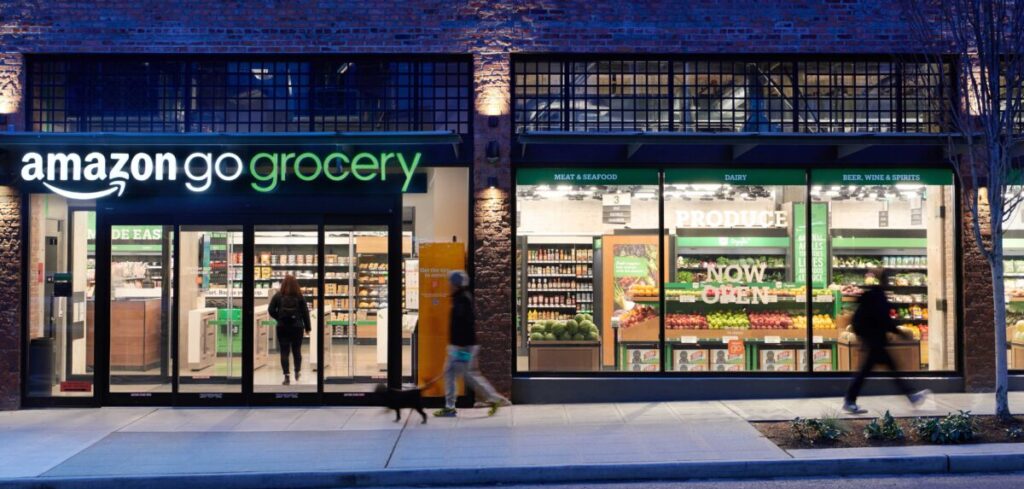Rumors that Amazon was buying an Italian supermarket chain were quickly quashed. But would the online giant be in the market for a retail footprint in Italy? Ian Kerr (Postal Hub podcast) and Marek Różycki (Last Mile Experts) discuss the possibilities.
Italian financial newspaper Il Sole 24 Ore recently suggested that Amazon was looking to acquire supermarket chain Esselunga. The report was swiftly denied by the grocer’s owners but it leaves open the question of whether or not Amazon will invest in this space.
Amazon’s recent history with supermarket acquisitions is well known, with many analysts giving their opinions on the e-commerce giant’s Whole Foods Market deal.
In Italy, Amazon has worked with several leading supermarket chains for fresh products and for delivery. The most visible partnership is with Pam Supermarkets, and Amazon lockers can be found in many of the company’s 1,035 stores. This is not Amazon’s only retail partnership for parcel locker locations. It also has a deal with fuel retailer Eni, where parcel lockers sit in petrol station forecourts, looking unloved, especially where they are far from the consignees’ homes.
Italian shoppers can shop on Amazon for fresh products, including super-fast delivery in selected areas from regional supermarket U2 and Amazon’s own Amazon Fresh range. Health-food retailer NaturaSì previously collaborated with Amazon Prime Now.
Esselunga has 87 of its own parcel lockers across northern Italy, including some refrigerated lockers from Cleveron.
Location is key
So, if Amazon did want to acquire a supermarket in Italy, what would it look for?
The key goal in any deal would be to provide Amazon locations close to and convenient for the consignees. Proximity is key for fast and cost-effective last-mile delivery (but also for any customer-centric click-and-collect option), especially for fresh items.
Similarly, locations where localized stock can be held are an absolute must for fresh and on-demand delivery.
This is why Amazon needed Whole Foods Market in the US and also why it will need strong strategic partnerships, or an acquisition(s), in Italy.
But what supermarket chain should Amazon buy or team up with? It’s simple really: the grocer(s) able to offer the best and densest infrastructure close to the consignee, ideally with good customer-centric service.
Antonio Perini, CEO of Milkman Technologies, says an early investment will pay dividends in the future: “The recipe to win the grocery delivery game has three ingredients: distribution centers, an owned fleet and last-mile software capable of shaping consumer demand and adapting it to logistic needs.”
Technology investment
The rise of on-demand shopping apps, including local startup Everli (formerly Supermercato24), may also be sharpening Amazon’s interest.
The tech side of grocery delivery is therefore crucial. Italian online supermarket chain EasyCoop has implemented Milkman Technologies’ international home delivery platform.
“Consumers mainly ask for freedom,” Perini says. “Why do many retailers force people to choose fixed two-hour delivery slots? We work with flexible time slots because one out of three consumers will be home anyway and might benefit from a discounted option.”
Amazon wants to grow its grocery business, as shown by its continuing investment in Amazon Fresh and its bricks-and-mortar grocery stores in the USA. But if it wants to be a major player in Italy it will need to overcome the local competition.
E-commerce represents only 3% of turnover for Italian supermarkets, even after the e-commerce boom brought about by the pandemic. Supermarkets are putting more effort into creating an online offering, although in many instances this is restricted to partnering with companies like Everli and Glovo.
So, while the local competition is weak, and there may be some cultural resistance to allowing a gig economy driver to pick and deliver fresh produce, Amazon may see an opportunity to acquire a local supermarket chain and bring together in-store shopping, click-and-collect via parcel lockers, and on-demand delivery direct to the consumer from local warehouses.
Although this article is largely speculative (the merger and acquisition part, at least), it will be interesting to see what finally happens and how Amazon realizes its ‘Italian Job’.
Follow us on LinkedIn: https://www.linkedin.com/showcase/last-mile-prophets/
Bios

Ian Kerr is the founder and host of the Postal Hub Podcast, the weekly podcast for the postal and delivery sectors.

Marek Różycki is managing partner at Last Mile Experts, specializing in CEP and e-commerce last-mile advisory.


